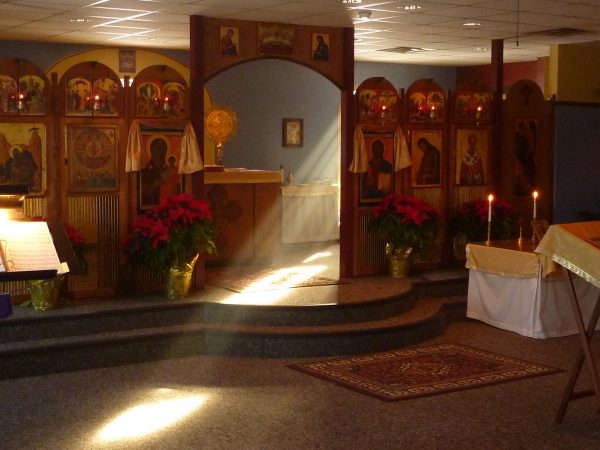In today’s Gospel lesson from the book of St. Luke, we can see Our Savior pull back the vail of His teachings that are sometimes not so easily understood by His disciples. And like those men and women back in the first century we too are often unsure or confused about the message that Christ is trying to give to us. So many times, after reading a Gospel passage, I find myself asking, just like the disciples, “What does this parable mean?” And in the case of today’s parable, the answer may not be that obvious, either.
To understand this parable, we must take a few moments and look at the whole event from which today’s reading was taken. When we restrict ourselves just to the verses included in a specific lectionary reading, or even worse, take a single verse out of the entire account and try to force an unintended understanding upon it, we run the risk of losing the true meaning behind the teaching. Originally, the Gospel was intended to be read as a book, without chapters or verses. This, of course, would be a bit impractical in the Church liturgical setting, so we rely on the guidance of the Church and our Orthodox tradition to help us understand the meaning behind the scriptural lessons.
One part of today’s reading that needs further explanation is Jesus’ response to His disciples’ question regarding the meaning of the parable. Jesus said: “To you it has been given to know the mysteries of the kingdom of God, but to the rest it is given in parables, that ‘Seeing they may not see,and hearing they may not understand.’” We might ask: “Why does God want to hide the meaning of these teachings? Shouldn’t everyone be able to understand God’s Word?” This can be a difficult thing to reconcile if we do not fully comprehend what Jesus is trying to teach His disciples. It can be even harder to justify based on certain English translations that are available today. In some versions of this particular passage, the Greek word mysteria is translated as “secrets,” thus losing the Orthodox Christian understanding of the word “mystery.” The mysteries of God described in the Bible are not the same as those found in a “who-done-it” murder fiction, where the reader is encouraged to employ all his or her intelligence and logical deductive skills to come to a definitive, scientific explanation based on the evidence in the story. Instead, we understand mysteries to be the presence of the Kingdom of God which cannot be defined in human terms. The Church calls us to be more like St. Paul and less like Sherlock Holmes when discerning God’s Holy Word.
When Jesus stated, “Seeing they may not see, and hearing they may not understand,” He was paraphrasing from the sixth chapter of the book of Isaiah (v.9). In these passages, we read the instructions given by God to the prophet Isaiah: “And He said, ‘Go, and tell this people: “Keep on hearing, but do not understand;Keep on seeing, but do not perceive.”’” This is not a curse by God on the people, but rather a curse by the people on themselves. Because of their unwillingness to believe all the things they hear and see, they remain ignorant of the truth of God’s messenger and thus are unable to enjoy the fullness of God’s blessings. Jesus is pointing out the same reaction to God’s messenger that Isaiah encountered in his time over 700 years earlier. Regarding this spiritual blindness, St. John Chrysostom explained: “If the blindness were natural, it would have been proper for God to open their eyes; but because it was a voluntary and self-chosen blindness, He does not overthrow their free will.” In other words, it was a blindness of the will. To see with the “eyes of our heart” and to thus fully embrace the blessing of God requires us to be open to the will of God. We must view everything through the prism of love. We must be ready to sacrifice our selfish pride and willing to take up the cross of Christ.
We can begin this journey of understanding by asking ourselves, which of the soils described in this morning’s reading best describes my own life? Does my life represent the wayside, so when the seed of the word of God is scattered, it gets trampled or eaten by the birds? St. Cyril of Alexandria (AD 378-444), likens the word to seeds that are trampled by unclean spirits and even Satan himself. The precious word of God never even has a chance to take root before it is smashed underfoot, or carried away and devoured. This is not unlike Christ’s teaching against casting our pearls before swine. Pigs will be pigs, and they have no appreciation for what is holy and precious, and by their ignorant rejection, they turn what is priceless into muck.
Does our life more closely resemble the seeds that fell on the rock, which managed to germinate but were unable to take root due to the hard conditions below the surface? St. Cyril describes this condition as representing a person who has a “religion without roots” and “a faith that is simply a matter of words.” They are happy to be part of a Church and may even actively participate in the sacraments, but they are not serious about their faith. This type of person forgets the teachings of the Church as soon as he leaves the building, and abandons the faith at the first sign of confrontation. These are the lukewarm Christians who have not found their true place or purpose within God’s Kingdom.
The third type of person represented in today’s parable has a life that is full of the weeds and thorns of the world, which are the cares and concerns that can choke the joy out of our Christian faith. Any holiness that may have existed was very brief, and the love of God never had a chance to fully mature. Maybe it was the cares of job or family, or possibly it was simply killed by our never-ending pursuit of worldly riches and pleasure. Whatever the “weed” may be, it was allow to flourish at the expense our life with God and our home in the Heavenly Kingdom. This situation seems particularly sad since these are the people who at one point in their life had a taste of God’s sweet love. But when their situation changed, either for the better or for the worse, they allow the distractions of daily life to push out and kill that which was precious at one point in their life. They do not value God’s beautiful garden enough to take the time to pull out those weeds and allow God’s word to grow within.
Jesus finally confirms that it is the last person in the parable, represented by the “good ground,” who bear the fruit of the spirit with the right amount of patience. As anyone who has ever planted a garden knows, it takes a long time, with the proper conditions, for a seed to grow into a mature plant. The gardener must till the soil, plant the seed, water it and finally protect it from the outside influences that would work to destroy it. It is no different for us as well. We must cultivate the soil which is our heart so that when the seeds of the word of God are planted, they may sprout, grow strong and bear good fruit for God’s Kingdom.
And this brings us back to the question I posed at the being of this sermon, “What does this parable mean?” Or probably more to the point, how can I learn the meaning of God’s word? What will it take for me to be “given to know themysteries of the kingdom of God”? As pointed out earlier, it is vital that each of us remain grafted into the vine that is Christ and His body, the Church (Romans 11:17). We know that within the Church is life, but outside is death. We must also emulate the “good ground” described in today’s parable, providing God’s word a perfect place to grow to maturity and thus produce even more good fruit. Any other soil is unfit for God’s word to grow.
What Jesus said to His disciples back in the first century applies to His disciples today. There is no “secret” to God’s “mysteries.” We must be fully committed participants in the life of the Church, not only when we’re in the building and surrounded by others of like precious faith, but everywhere and at allt imes. This is how we cultivate the soil that is our heart, and prepare it to receive the seed which is the word of God, so that it may grow strong and bear more fruit for His Kingdom.

















